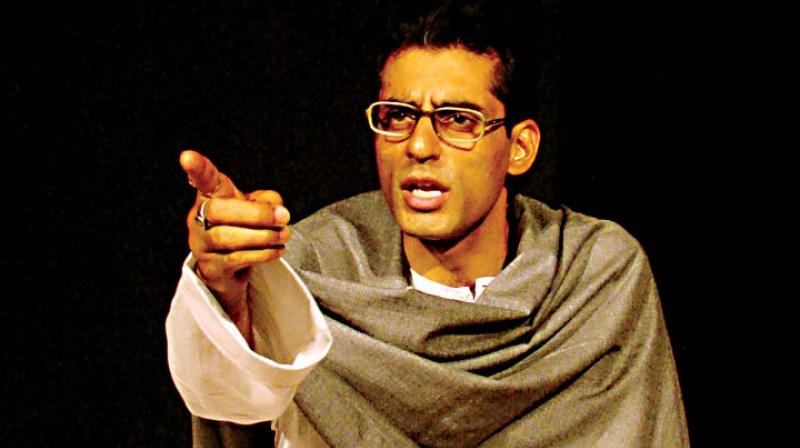Liberation!
Playing Manto and the art of red nose clowning.

Ashwath Bhatt claims that he would have introduced Manto and his writings to at least a hundred thousand people so far, thanks to more than 50 shows of his play over the past decade.
Playing Saadat Hasan Manto so many times and for so long - since 1997 - actor Ashwath Bhatt is wont to say that he is like Manto only. Oh, he hastens to add, he doesn’t write as well. Manto, a distressingly prophetic Pakistani writer/journalist who wrote human angle stories during the time of India-Pakistan partition, has been compared to D H Lawrence, Oscar Wilde and Guy de Maupassant. Although the writer died in 1955 at the age of 47 when alcoholism took its toll, Bhatt laughs sardonically that because “human beings don’t learn” Manto’s writings are just as relevant today as it was then.
Which is why his play Ek Mulaqat Manto Se - A meeting with Manto - still has the ability to pull in viewers again and again. As the spotlight shines on the kurta-pajama clad gaunt looking Bhatt who, incidentally has perfected the art of looking like Manto, smokes (an aside: is it even allowed in theatres?) and narrates his dialogues, it does feel like the writer has appeared from the past. Bhatt’s efforts of fleshing out the intense writing into a play form, he calls it as ‘conceived and performed’, has been a challenge and it took him a couple of years to get it right.
When he had first played Manto at the Nehru Centre in London, actor playwright Girish Karnad was in the audience. Karnad suggested to him to go solo and perform Khol Do (Open It), a famous short story depicting the violence and barbaric acts committed by human beings across the border without stressing on their religion. Bhatt deterred, saying it was too famous and iconic, however, Karnad urged him to do so. “He told me that it will be my own unique interpretation,” Bhatt said.
Apart from iconic stories, Bhatt also tells the life story of Manto, his trials and tribulations, almost like a soliloquy. Off stage, the similarities between the two still surprise him. Apart from the fact that he is a Kashmiri and Manto was close to Kashmir, Bhatt says that people call him fearless in voicing opinions and “dare I say, first a good human being and then an artist”.
Researching into Manto’s life - which included a stay in Lakshmi Mansions, the house in which the writer had lived and written - has changed him in many ways. “Manto was a great observer of life. I have learnt to dig deep into everything, observe closely and talk to people I meet however brief it is; in order to receive perspectives.”
Bhatt narrated one incident when he was talking to a friend, a producer from Kashmir, about a heart-warming story which he plans to use in a script. His friend spoke of an Indian army Commandant who would conduct crackdowns in far flung villages in Kashmir in order to flush out the terrorists. These usually happened at the crack of dawn or late at night and villagers would have to sit out and wait for hours. The officer would call the youth and children aside and give them a football or cricket kits and ask them to go and play in the open ground. “His fame grew and people started to like him,” Bhatt told me. “Besides, what an out-of-the-box idea.”
The performer in him taps into such stories with relish. A trained dramatist, he trained at the National School of Drama and the London Academy of Music and Dramatics (LAMDA). It is at LAMDA that another facet of performance came out - Bhatt discovered the art of red nose clowning. “The red nose is the world’s smallest mask,” he said as he elaborated on the need to tap the inner clown in oneself. Clowns are good people who have got a bad rap thanks to the fact that fools are confused with clowns. He laughed at his joke.
“Do you know that coulrophobia is one of the big five phobias people have”, he asked.
Bhatt is a regular speaker at festivals including the recently held National Clown Festival in Mumbai (Yes, he asserted, there is such a festival). In the clown workshops he holds, the feedback Bhatt gets from participants are the feelings of being liberated and relieved. “It is a huge stress reliever for me as well since coming from Kashmir, we have our own baggage.”
So, between playing Manto and being a clown, Bhatt has been busy travelling across the country - 22 cities this year. “The day Manto stops being relevant, it will be the happiest day for humanity, and Manto himself, for the world would be a better place.” Until then Manto’s writings (and Bhatt’s play) will continue to slap society.
